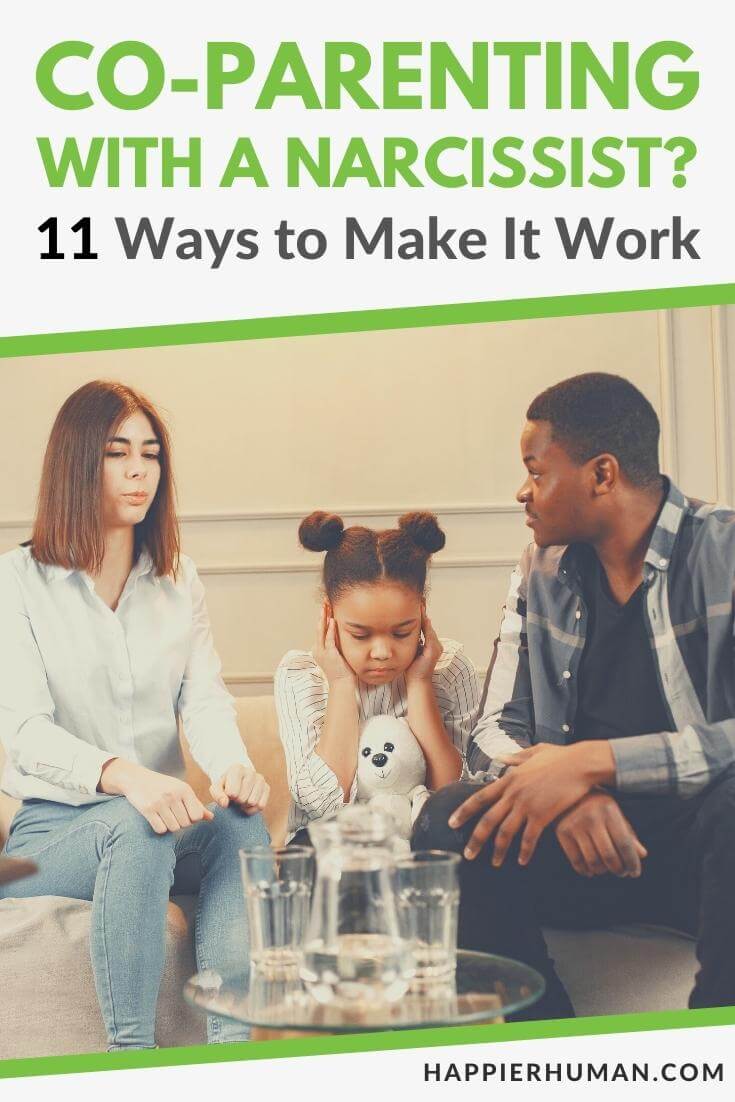Once your relationship with the narcissist parent of your child comes to an end, the focus then shifts to co-parenting with a narcissist in the most amicable way. Destructive narcissists are difficult to deal with, period. When children are involved, shared parenting can quickly turn into a nightmare if not managed properly.
I know a male narcissist who gave his ex-wife a hard time when it came to sticking to his co-parenting and child support schedule. He played the victim card to poison the children’s minds against their mother and gain favor with them.
It’s perfectly normal to worry or feel fearful for your children’s physical and emotional well-being, considering what your ex might be capable of. That said, I hope you can find solace in our list of 11 ways to co-parent and keep the peace with such a toxic person.
The overarching goal is to promote civil parenting while protecting the best interest of your child and your mental health. I’ll also go over how a narcissistic parent can affect your children and what to do to shield them.
What Is a Narcissist?
A narcissist is someone who is excessively self-absorbed, has an unusual sense of entitlement, and craves constant admiration. They gaslight and manipulate others to get their needs met. Because of an innate lack of emotional empathy, they treat people as objects they can use and discard. Their children are no exception.
Narcissistic personality disorder
Narcissists are those who show signs of a narcissistic personality disorder (NPD), or narcissism, as detailed in the Diagnostic and Statistical Manual of Mental Disorders Fifth Edition (DSM-5). The mental disorder is responsible for their harmful behavior toward others.
An expert article on Narcissism summed up some core personality traits of narcissists, noting that these individuals are “excessively fixated on their own needs.” Their relationships are largely superficial and designed to satisfy needs- including attention, admiration, and control. They aren’t afraid to commit narcissistic abuse to get those needs met.
Keep that at the forefront of your mind as we explore narcissism in relationships and how co-parenting with a narcissist can be problematic. Understanding the type of narcissistic parent you’re dealing with is also helpful in decoding their behavior and managing your interaction with them.
Narcissists come in different flavors. Here are the five basic types:
The Dangers of Being in a Relationship with a Narcissist
People with disruptive narcissistic tendencies create disharmony and emotionally abuse their partners and children. According to psychologists, the vulnerable (passive-aggressive), antagonistic (argumentative), and malignant (sociopathic) narcissists can be the most difficult to deal with.
In fact, malignant narcissists may exhibit sociopathic traits, which can make it scary to co-parent with them. Here are things your ex might do or say that may signal you’re co-parenting with a narcissist:
In a YouTube vlog, psychologist, Dr. Ramani Durvasula, said you’re put in a position where you wish for your kids to turn 18. You’ll no longer have to deal with the threats and play the diabolical back and forth with the narcissist.
What Is a Narcissistic Parent?
A narcissistic parent is defined as someone who is consistently possessive of and seeks to live through their child. This is according to Psychology Today. What’s more, the narcissist parent rarely ever loves the child for who they are.
They burden them with unreasonable expectations, e.g., wanting them to follow a certain career path. They’ll use emotional manipulation and threats to take away financial support to get the child to comply.

Your ex may have developed narcissistic traits from growing up with a narcissistic parent who was neglectful, highly critical, overprotective, or manipulative.
Genetics also play a role in NPD, according to a 2014 study that found traits like grandiosity and a sense of entitlement passed from parent to child.
How a Narcissistic Parenting Style Affects Children
A parent’s narcissistic behaviors can have long-term effects on children, according to Parents.com. Signs of the impact include a lack of self-worth, neglecting their own needs, becoming a people pleaser, anxiety, depression, and choosing narcissistic partners.
Trying to show the toxic co-parent how their actions affect you and the kids is pointless. They are unable to see the link since they lack empathy and self-awareness. The narcissist is convinced you’re the problem and will refuse to come to a fair compromise when co-parenting.
Not to mention their defensiveness, pathological lying, lack of accountability, and narcissistic rage when they don’t get their way.
11 Ways to Make Co-Parenting with a Narcissist Work
Forget trying to reason with your narcissistic ex about how to raise your children as a team. Their arrogance, spitefulness, and controlling behavior prevent them from seeing eye-to-eye with you. They may even accuse you of trying to take the kids away if you suggest a court-ordered agreement to make parenting amicable and equitable.
Here are 11 things you can do if you’ve found yourself in such a dilemma.
1. Trade co-parenting for parallel parenting
When dealing with a co-parent who has NPD, you may have to introduce a system called “parallel parenting” to successfully co-parent. This typically involves creating a legal parenting plan that allows the children to spend maximum time with either parent.
Under the plan or custody agreement, you can agree to split responsibilities instead of alternating between them to minimize parental contact and interaction. For example, agreeing to do school drop-offs, while your ex does pick-ups.
Communicate with the narcissist co-parent only when necessary, using more of an FYI approach if the situation doesn’t warrant discussions or negotiations. This can help cut out a lot of the back-and-forth drama narcissists thrive on.
2. Minimize contact
Don’t put it past the narcissist to contact you and make your life a living hell using various communication mediums. Minimize physical, phone, and email contact as much as practical. Remove or block them from accessing you on social media. They can use it to start a public smear campaign against you.
Use phone and email or other written forms of contact to communicate only necessary information related to your children’s welfare. Keep it short and keep your emotions out of it.
Do not engage in arguments or mudslinging. Remember that narcissists are petty and vindictive. They might use your words against you in court to try and paint you as an emotional abuser or an unfit parent.
3. Stick to the schedule/plans
A black-and-white approach is often the best way to deal with a narcissist. Once a parenting system is set up, stick to it as far as is practical. Because of their need to manipulate others to assert control, the other parent will try to change things up to suit their needs.
For example, rescheduling visitation or calling you at the last minute to pick up the kids from athletics practice when it’s clearly their responsibility.
People with NPD get an ego boost from creating chaos, so do not fall for their attempts to mess up your schedule or piss you off. They’ll try to pressure and bully you, but don’t take the bait. Respond by saying something like, “Let’s stick to the parenting plan.”
4. Set firm boundaries
Narcissists have a real problem with boundaries. They don’t like or respect them. Set and maintain boundaries, anyway, to protect your physical and emotional space. Boundaries are another way to limit your children’s exposure to the toxic parent.
An important boundary is establishing that you’ll communicate via email or text messaging, instead of phone calls. It’s much easier for conversations to derail over the phone.
Another thing, if your court agreement allows you visitation, you may set rules on when your ex can call while you’re spending time with your kids. This will keep them from constantly interfering with your bonding time or saying things to upset your children.
5. Document everything
Write everything down and record conversations if it gets to that. Narcissists are good at twisting events or things said to make you look bad. Log any and everything you think might be important to document.
For example, if they deny you court-ordered visitation or your child returns with marks of violence after visiting the narcissist.

A written (or audio) record of events can serve as evidence in case you want to take legal action, e.g., for full custody, or defend yourself against false accusations made by the co-parent. Having a witness can also give weight to your claims in court.
6. Use a co-parenting app
You can reduce the frustration of co-parenting with a narcissist by downloading and using a co-parenting app. Some are designed for organizing matters related to custody and child support.
Other features help simplify visitation schedules and log calls, pick-ups and drop-offs, and timeshare percentages.
You’re both able to notify each other of your schedules without discussion. There’s also a built-in feature that records conversations with dates and timestamps and tracks when messages/emails are received and read.
The narcissist is less able to deny communications or avoid accountability if you communicate via the app.
7. Manage parental alienation with care
A narcissist will try everything they can to make your kids hate you. A commonly-used manipulative tactic is one called parental alienation.
The toxic parent will intentionally try to alienate your child from you by saying mean or disparaging things about you. They want your children to dislike, resent, and reject you as the better parent. Your ex will use the tactic to make themselves the victim and gain your kids’ admiration.
Validate your child’s feelings if they wind up feeling hurt or confused. Do not try to get even by badmouthing the other parent. Do not get emotionally fired up or ask your ex to stop their antics. The day of reckoning for the narcissist will come. Your children will eventually recognize who’s the problem parent as they grow older.
8. Be your kid’s safe haven
Your divorce and co-parenting with a narcissist will take its toll on everyone in the family mentally and emotionally.
Provide a safe place for yourself and your kids by creating structure within the home. Maintain a schedule for learning, playing, sleeping, waking, and family fun.
Children tend to feel and behave better growing up in a predictable and loving environment. Try to love them and meet their needs without being overprotective or alienating the other parent.
Having an emotionally safe home environment can shield your kids from fear or anxiety whenever the narcissist attempts to manipulate, emotionally abuse, or crash their boundaries.
9. Build a support system
Parenting is a challenge in itself, let alone when having to deal with an uncooperative parent. You want to give your children some sense of normalcy and remain emotionally strong for them.
Establishing a ring of protective people around you is one way to shield yourself from your ex and avoid a nervous breakdown.
Staying connected to trusted friends and relatives helps prevent loneliness, anxiety, and despair. You’ll have someone to share your thoughts and feelings with and get feedback when you’re not sure how to deal with the challenges of shared parenting.
10. Protect your emotional and mental health
Dealing with a breakup, custody battle, visitation rights, and a narcissist who’s bent on making your life miserable can take its toll even on the most resilient people. Accepting that certain things are out of your control is a key step to avoiding excessive worry, anxiety, and depression.

Keeping your ex at arm’s length will help protect you from their gaslighting and emotional manipulation. In addition, practicing living in the present using meditation and mindfulness techniques can provide additional peace of mind.
Some moms and dads prefer to journal their thoughts, feelings, and emotions as a way to relieve the stress associated with co-parenting.
11. Consider family counseling
Look for a licensed therapist who can help you find ways to navigate the challenges associated with joint custody and split parenting.
Some family therapists can meet with you and your children if they aren’t coping well with the divorce and new parenting arrangement. If you like, you can introduce your kids to affirmations for kids about overcoming challenges.
Final Thoughts on Co Parenting with a Narcissist
Interacting with a narcissist can be very frustrating, whether in a relationship or co-parenting. The key is learning to treat things like a business arrangement and keeping your emotions out of the interactions. Moreover, following the suggested tips may help insulate you and your children from the narcissist’s toxic behaviors.
If your ex becomes emotionally or physically abusive, don’t hesitate to take legal steps to remove your children from their care. Legal actions can include petitioning for full custody and a restraining order.
In the meantime, learn more about the 5 Basic Types of Narcissists (and How to Identify Them) to get a feel of what you might be up against.
See more posts about dealing with a narcissist:
- 13 Narcissist Traits, Characteristics, & Warning Signs
- 11 Ways Narcissists Treat Their Exes (and How to React)
- 12 Important Strategies to Use When Divorcing a Narcissist


